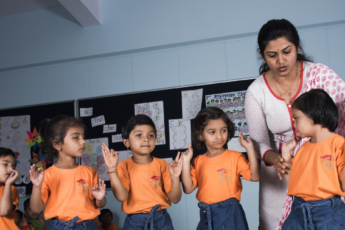Transforming Anganwadis Into Early Learning Centres

The largest child care program in the world, the Integrated Child Development Services (ICDS), is a powerful testament to our nation’s commitment to children and their development. Spanning each region in India, Anganwadi centres aim to reach children across rural areas and marginalised and disadvantaged sections of society. There are 1.36 million functional Anganwadi centres and over 25 lakh Anganwadi workers and helpers across the country.
While initially conceptualised to address malnutrition problems and provide nutrition to young children and mothers, the Anganwadis have now evolved to include intersectoral collaboration between health and education. At present, these centres focus on food, nutrition, and early childhood education equally.
Why The Focus On Early Childhood Education?
A young child’s brain sees the highest period of brain development in the early years; if this development is not nurtured in a supportive environment, their growth can falter, causing irreparable damage and lifelong repercussions.
While recognising the important role of nutrition and food in the growth and development of children, our policymakers kept in mind the nature of ECCE, which involves a holistic intervention that covers health, nutrition, and foundational learning (including psycho-social and emotional needs).
As the primary care providers for a majority of the population — out of the 240 million children in India aged between 0-8 years, 74%, i.e., 178 million live in rural areas — Anganwadi workers truly are at the frontlines of early development.
These warriors have already proven their mettle while impacting nutrition across India. The United Nations International Children’s Emergency Fund (UNICEF) calls them instrumental to child development for the role they play in fighting malnutrition.
The New Education Policy (NEP) 2020 recognises the immense reach and potential of these centres. The guidelines now require Anganwadi workers to impart pre-primary education to their charges, thus turning them into early years’ educators.
While a visionary thought, certain challenges impede a swift transition for the workers: adequate knowledge of ECCE, qualification and training dedicated to early childhood education, structured curriculum and resources, and an understanding of 21st century skills and methodology.
Journey From Anganwadi Workers To Anganwadi Educators
As leaders in the early education space, we at Square Panda India believe we need a three-pronged approach to empower Anganwadis as the NEP 2020 envisions:
- Training And Skills Development: Anganwadi workers will need to be skilled in the pedagogy of today’s changing world, including adapting to a teaching-learning methodology that is more hands-on, experiential, and play-based. The main objective of this training should empower Anganwadi workers with knowledge of ECCE, including the neuroscience behind early learning, an understanding of various early childhood education schemes, and a well-rounded understanding of nutrition and how it affects learning and the young mind.
- Build An Early Learning Ecosystem: An early learning ecosystem cannot exist without the support of each of the early childhood education stakeholders – parents, pre-primary and primary teachers, principals, Anganwadi workers, administrators, and other early years’ educators. To create a nurturing environment for children, we need to combine the efforts of each of these stakeholders and build an early learning community to share knowledge and information, taking our early learning landscape to new heights.
- Hand-holding And Support: To ensure seamless transition from Anganwadi workers to Anganwadi educators, they need to be supported by a network of resources that are easily available at their disposal. Technology and digital tools can be leveraged for a more comprehensive approach to reduce the Anganwadi workers’ burden.
India has left its mark on the world and the early childhood development sector with the ICDS scheme. The Anganwadis have the power to break the vicious cycle of undereducation, and holistically develop children’s minds and health equally. All that is needed is our support, investment, and an enabling environment.
Square Panda India’s Anganwadi Workers Upskilling Program aims to empower Anganwadi workers, transforming these centres to their fullest potential for children’s holistic development. Learn more about our programs here.




Leave a Comment